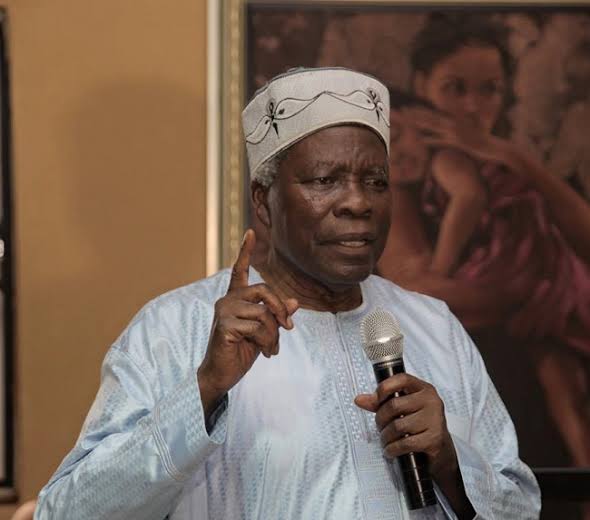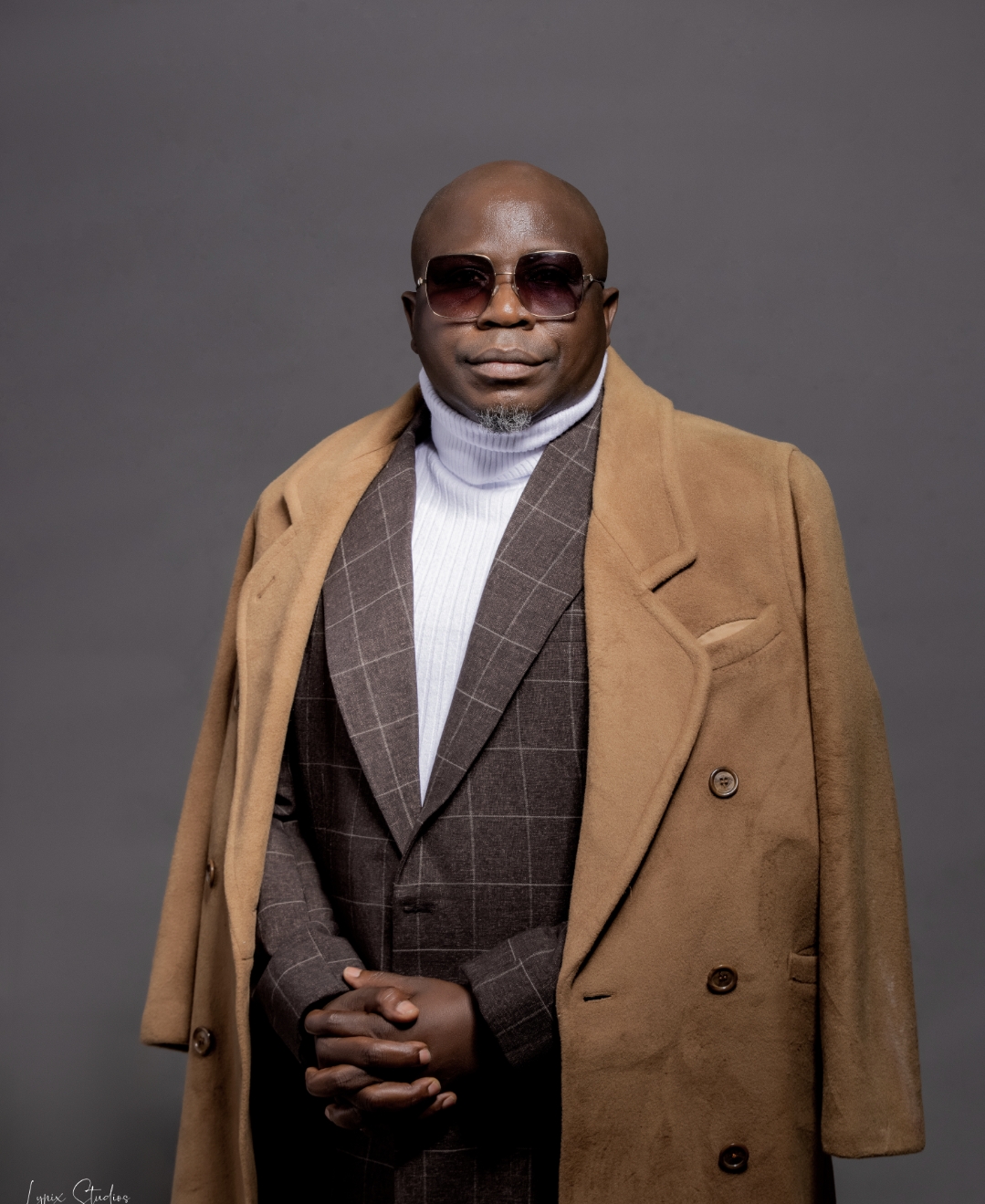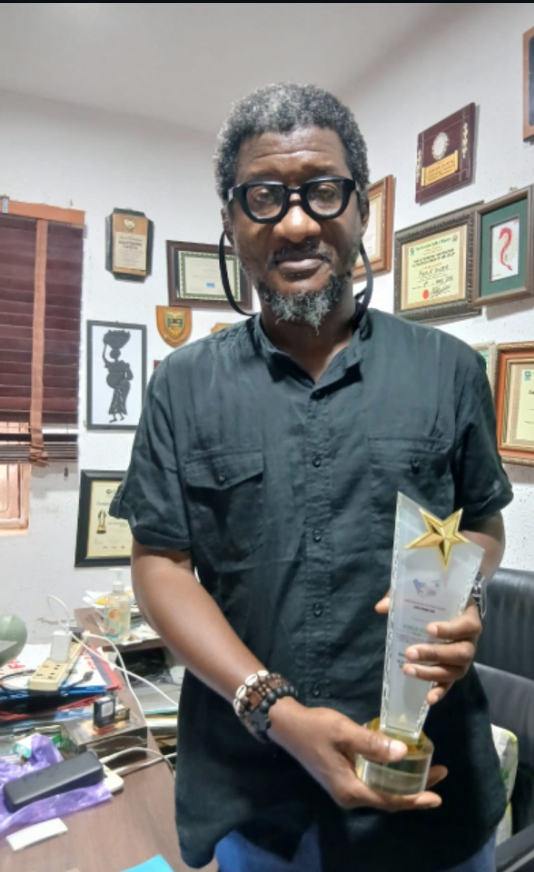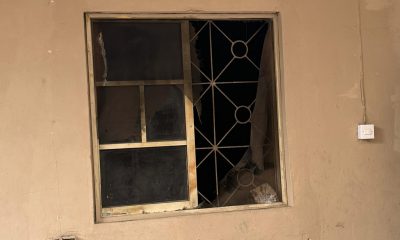celebrity radar - gossips
PROF. BANJI AKINTOYE: THE NEW LEADER OF YORUBA NATION

PROF. BANJI AKINTOYE: THE NEW LEADER OF YORUBA NATION
When he set out on his journey for intellectual quest in 1943, the world was not in the position to fathom the magnificence of his brilliance. The world knew that education had great benefits. It knew that with education, one’s horizon could be honed. One’s depth could be deepened. One’s breadth could become boundless. With education, the World knew that anything could be possible.
But when education becomes immersed in unbridled intellect; or becomes pulsated by seminal luminosity; or inured with effulgent resplendence, it elevates to the seventh heaven of intellectual inebriation. An inebriation buoyed by a brilliance perching and sparkling on the pedestal of splendour, unequalled and unrivaled. This, the world came to discover later about him.
A deeper look at the journey from Emmanuel Primary School, Ado- Ekiti, through Christ’s High School, Ado-Ekiti to the then University of London, now University of Ibadan, Ibadan, showed that at every point, at every turn, an inspiring intellectual sagacity, a humbling radiance of brilliance, a marvellously awesome ingenuity, intimidating in its irresistible magnetism has been the hallmark, it has been the trademark, a sort of emblem, the signet of his quest. Becoming distinguished at every point, at every level, at every turn became just a matter of course.
To him, being brilliant could be fairish, a kind of humdrum, very middling, boring in fact, because it is a common place. Yet the awesomeness of his intellect, his brilliance, is just what it is, awesome. His is alarmingly breath taking; delightfully terrifying, fragrantly frightening. Intimidating yet comforting, bullish yet affectionate, bewildering in its buoyance and sublime in its ebullience.
When he discusses History as a subject or of a place, or of a people or of a particular era in the timeline of humanity, his listeners are guaranteed a soulful food that buoys their spirits and beings. His lectures on and in History, are like fountains of life, flooding the firmaments of our fantasies, creating a curative curiosity that coerces our consciousness into a “furnacious” desire to want to be free, to want to know thyself, familiarise with thy trajectory, thy History, and thy heritage bequeathed.
His lectures, in and outside the classroom, for those lucky to have gone through him, are like introduction to addiction. It makes you feel excited. It makes you feel high. You feel afloat, like a spacewalker. And you become hungry. Ravenously so, because you want more. You are transported from the environment of your consciousness to witness in your imaginations, centuries of heroism, villainy, building of kingdoms and empires and the destruction of others.
It could be about the Chinese. Or the Indians. Or the Europeans. It could be about the North America; or Canada. It could have been about South American countries of Brazil, Argentina, Peru, Paraguay and or any of the adjoining countries. It could be about the Caribbean countries, their travails and triumphs. It could be about the paths paved by the Pharaohs, the authentic Negroid ones or the vicissitudes of the peoples of the African continent.
It could be about revolutions and political systems. It could be about social changes and the factors that enabled them. It could be about developmental History of any people of any Nation around the planet. He seems to know it all. And when he speaks, especially off the cuff, and you watch him, as you listen to him, one feels the aroma of a beautiful and irresistible champagne that has been centuries old. One becomes calmly excited and helplessly drunk on the knowledge disemboweled. One becomes quietly crippled by curiosity and stupefied by details that would have eloped from the memories of others.
The suction of the diction, the phonetics and phonemics, the inflection and intonation, the eloquence and elocution marinates you in phonological and philological pensiveness. One is transmuted into blissful delirium, taken into the boundless boundaries of paradisiac haven. The substance, always arresting, was often delivered in a beautiful and thrumming language.
And when the subject is even Yoruba History, it becomes something special. It becomes ethereal. It becomes divine. It becomes celestial. It becomes a different thing entirely. Unwittingly, you glow with unconscious attestation to the valiance, gallantry and the courage of your forebears. You imagined their mistakes and you become a born – again patriot. You become a born again true born. Without you knowing it, you, as a matter of course, exude with marinating pride.
With your arms extended and shaped like that of a crab, you begin to walk around with your head held high having discovered more of yourself, more of your being, more about your ancestors, your forefathers, the progenitors of your race. You become imbued with a more solidified self-esteem. You become educated, in the real sense of it.
His book, “A History of the Yoruba,” is sans pareil of its genre. It is the finest and most complete in its encapsulation of and on Yoruba as a people, as a Race and as a Nation before and since Samuel Johnson’s “A History of the Yorubas from the Earliest Times to the Beginning of the British Protectorate.” Samuel Johnson was an Oyo Prince, a grandson of Alaafin Abiodun Adegorolu just like him, who is an Ado-Ekiti Prince.
The book by this teacher of teachers, is the manifestation of rigorous, meticulous, exacting, focused, ascetic and severely organised intellect. I had come across the transcript in his Hatfield, Pennsylvania home in the US, while rummaging through his Library. The materials that stared at me as I flipped through the pages gushed with rigour of hard work, richness of resources, depth of dedication, tantalizing intellect and brimming brilliance.
As one of the privileged few to read the transcript before it went to the press, one could easily fathom the amount of sweat that went into such humongous product. The prodigious intellect and the stupendous brilliance that went into that work was discernible and decipherable. A work of 35 years of research via reading, travelling, interviews, archeology, arts, musicology, linguistics, folklore et al. If you want to have credible knowledge about the Yoruba Nation and its peoples, go and buy a copy.
You will also be doing yourself a great favour, if you would seek out “Ife: Before Oduduwa,” another seminal work of research by this great mind. You would be greatly rewarded for doing so. You would be disabused of unfounded tall tales trolling around. You would be able to separate mythology from authentic History.
Looking at his curriculum vitae, one did not even have any idea of how to refer to him. Would it have been alright to call him a “Prince,” which he is; or a “Pastor” as which he has distinguished himself? Would it have been right to call him a “Professor,” as which he has been eminently edified? Or would it had been better if one calls him “Senator” which he was in the Second Republic and during which period he turned enemies and detractors to friends and admirers because of his transcendent brilliance on the floor of the Senate?
To be honest, to delve into his records would be a titanic task. But one could easily avail the readers the fact that he has taught 18 different subjects in History. He supervised Doctoral students for 16 years. He has held 27 different positions in different Universities in Nigeria and abroad. He has held 16 Public Offices. He has held 5 different position in different churches. He has published 10 different chapters in different Joint Works. He has published articles in 7 Academic Journals. He has published 7 books. He has delivered 23 research papers at seminars across the world.
In 1970, the Ministry of Education, Western State of Nigeria requested him, to prepare for the Ministry, scripts and teachers’ notes in African History for the use of Nigerian Secondary Schools and Teacher Training Colleges during the School year of 1971. The scripts and notes were to cover the later periods of the School Certificate syllabus in African History. “African in the 19th and 20th Centuries”. He prepared these materials under the general title of “Emergent States of Africa”.
Under this general title, he set out 28 topics, and prepared a main script and a “teachers notes” on each topic. The main scripts were broadcast as radio lessons by the Ministry of Education to Nigerian Secondary Schools and Teacher Training Colleges throughout Nigeria. Following demands by the teachers and their students to the Ministry and to him that the scripts be published, the Ministry began to serialize them in 1972, in its school’s journal, Pupil. In 1972-73, under a programme of International cooperation between Kenya and Nigeria, the Kenyan Broadcasting Service broadcast the scripts to Kenyan schools.
Consequent on the success of the 1971 program, the Ministry asked him again in 1972 to prepare a similar program in the second history syllabus of the West African School Certificate – “West Africa from 1500-1800” – for use in the 1973-74 school year. This, under the general title of “West African Kingdoms and empires in Pre-colonial times” was also made up of 28 thirty-minute lessons that were broadcast one per week throughout the 1973-74 school year.
He was a member of the panel of historians set up in 1969 by the Nigerian Federal Government to assemble, and advise on the preservation of, the documentation of the recent history of Nigeria, especially the history of the Nigerian Civil War 1967-70. From 1968 to 1972, the History Department, Obafemi Awolowo University charged him with the duty of building up the facilities for a new course entitled “History of the U.S.A.”. This course has been regularly taught in the Department since then. In 1981-90, he was appointed by UNESCO as member of the International Scientific Committee on a ‘General History of Latin America’.
As Director of the Institute of African studies at University of Ife, now Obafemi Awolowo University, he directed the designing, organization, promotion, funding and supervision of collaborative, inter-departmental, and individual research in a broad spectrum of African Studies: History, Art History, Archaeology, Musicology, Linguistics, Folklore, and Cultures of the African Diaspora.
He was member, Nigerian National Archives Commission, 1970-78. Member, Nigerian Museums & Antiquities Commission, 1975-79. Member, Nigerian National Council for Arts & Culture. Special Adviser, Nigerian Delegation to the Inter-governmental Conference on Cultural Policies in Africa, Accra, Ghana, 1975. Secretary, National Committee for Nigerian Cultural Policy, 1976-78. Assistant National Secretary, Unity Party of Nigeria, 1978-83.
As a Senator of the Federal republic of Nigeria, 1979-83, he was member, Foreign Relations Committee of Senate: member, Senate Committee on Petroleum & Energy; member, Internal Affairs Committee of Senate. He was also Chairman, Senate Delegation to the United Nations Peace-keeping Force in Lebanon, 1981; member, Nigerian National Delegation to the 1981 General Assembly of the United Nations Organization. He was a Nigerian Delegate to World Conference on Actions Against Apartheid, London, 1981 and member, Nigerian Senate Delegation on Fraternal Visit to the Soviet Union, 1982. He was also the Commissioner for Health, Ondo State, Nigeria, 1983-4.
Immersed in activism from birth, he has been unable to extricate himself from the binding cords of activism dedicated to the improvement of Nigeria in general and the Yoruba Nation in particular. From his days at the University of Ibadan to now, he has been a constant fighter for the improvement of his people. He was President, All-Nigeria United Nations Students Association (ANUNSA), 1958-1960 and Nigerian Delegate at the General Conference of the International Students Movement for the United Nations (ISMUN), Lund Sweden, 1960. He was the First International Vice-President, International Students Movement for the United Nations (ISMUN), 1960-63 (elected at the General Conference in Lund, Sweden, 1960).
He was the Secretary-General, Nigerian Committee of the World University Service, 1958-1961. He was Nigerian Delegate, Second Pan-African Students Conference, Tunis, 1959. Nigerian delegate, World Assembly of the World University Service, Tutzing, Germany 1960 and Leader of Nigerian Delegation, East, West and Central African Students Conference, Addis Ababa, Ethiopia, 1960. At the International Seminar on the United Nations Organization, Ibadan, 1960, he was the Chief Host as President of the All-Nigeria United Nations Students Association. He was also the Special Guest, Council for Leaders and Specialists, U.S. State Department, Washington, D.C., March – August 1971.
He was the Leader of Visiting Team on Research Project, ‘African Diaspora’, Bahia, Brazil, 1975. He presented the major paper, at the Seminar on ‘The Military in African History’, Accra, Ghana, 1975. He was the presenter of the lecture at the Seminar in Honour of Leopold Sedar Senghor, Dakar, Senegal, 1975. He was a Nigerian Delegate, World University Service Seminar, University of Hong Kong, Hong Kong 1976 and Leader, Nigerian Delegation, World University Service World Congress, Manilla, Philippines, 1976.
He was a Nigerian Senate Delegate on Official Visits to Countries of West Africa, 1980. Special Guest, UNESCO Seminar on ‘African Contributions to the History of the Americas’, Barbados, 1980; to United Nations Annual Conference, New York, USA, 1980; to Morocco, 1981; to the Soviet Union, 1981; to Argentina, 1981; to Indonesia, 1982; to Taiwan, 1982 and to India, 1982. He was Guest Speaker, Institute of International Relations & National Security, Seoul, South Korea, 1982.
A first class patriot of the highest order, I have watched him cry, yes, shedding silent bitter tears in the glare of all present, on the geometric degeneration of the Yoruba Nation into an unmitigated miasma, at an occasion in Wilmington, in the State of Delaware, United States in 2013. Pierced to the marrows by the poisonous effluvia permeating and pervading the Yoruba polity, the pains of unfulfilled dreams of what the Yoruba Nation could have been was always patently inscribed on his demeanour.
He does not fear to say that the Yoruba nation is too industrious to be poor, and that the massive poverty now existing among Yoruba people is a product of the fact that Nigeria has been dragging the Yoruba nation down. He also does not fear to say that he himself would be ready, if and when the time is right, to give his support and energy, in this his old age, to serious efforts at the liberation of the Yoruba nation from its present imprisonment in Nigeria.
In spite of his age, at 83, he remains a voice of hope to a dejected and dithering Yoruba Nation. He is one voice of clairvoyance and courage that keeps soldiering on. He has intractably, kept close to his roots in academia, spoken to student classes in some universities, and served as convocation lecturer at some university and polytechnic graduation convocations. “I cannot cease researching and writing”, he often says; and those close to him are aware that he is always working on some important writings and books.
He is Stephen Adebanji Akintoye, also known as Banji Akintoye, the teacher of teachers. A walking encyclopaedia of History. A dandy of diction. A well of wisdom. A proboscis of brilliance. A totem of intellect. A tendon of integrity. An exemplar of excellence. An edification of dignity. Primus inter pares. And a PATRIOT.
©️REMI OYEYEMI
celebrity radar - gossips
Laffmattazz with Gbenga Adeyinka & Friends Returns In 2026, As Canada Joins Tour

Laffmattazz with Gbenga Adeyinka & Friends Returns In 2026, As Canada Joins Tour
Nigeria’s longest-running and most consistent comedy tour, LaffMattazz with Gbenga Adeyinka & Friends, has officially announced its 2026 tour themed “Next Chapter.” The upcoming edition marks a major milestone as the brand celebrates its 15th edition with a bold expansion that includes Canada for the first time.
The Next Chapter edition represents a clear evolution from previous years — signaling growth, global reach, and a renewed creative vision. While past editions focused on taking premium comedy experiences across Nigerian cities, the 2026 tour elevates the brand with international exposure, upgraded production, and stronger engagement with audiences at home and in the diaspora.
Speaking on the significance of the new theme, organizers describe the 15th edition as more than a celebration of longevity, but a statement of intent — positioning LaffMattazz as a global Nigerian entertainment export.
CONFIRMED TOUR CITIES & VENUES
•Ibadan – Jogor Center (Easter Sunday, April 5th, 2026)
•Akure – The Dome International Culture & Event Center
•Abeokuta – OOPL Marquee
•Lagos – Balmoral Convention Center
•Canada – Multi-city tour (dates to be announced)
Audiences can expect a rich blend of comedy, music, and surprise guest appearances — delivered with the signature “& Friends” experience that has defined the tour for over a decade.
With the Next Chapter, LaffMattazz reinforces its legacy while opening new doors for African comedy on the global stage.
celebrity radar - gossips
Kevin David Kaydee Releases Inspiring Single “Oluwa Settle Me”

Kevin David Kaydee Releases Inspiring Single “Oluwa Settle Me”
Rising music artist Kevin David Kaydee has released a powerful new single titled Oluwa Settle Me, a soulful Afro-inspired anthem that blends heartfelt prayer with modern rhythm.
“Oluwa Settle Me” captures the everyday cry of many believers seeking breakthrough, peace, and divine favour. With emotionally rich melodies and uplifting instrumentation, the song expresses a sincere plea to God for complete answers to life’s pressing questions—career, destiny, relationships, and spiritual fulfilment.

Drawing from Afrocentric sounds and contemporary gospel influences, the track stands out for its simplicity, sincerity, and spiritual depth. Kevin David Kaydee delivers the message with passion, creating a worshipful atmosphere that resonates across age groups and cultures.
The song’s message of hope and dependence on God positions it as more than just music,it is a prayer set to melody. By fusing spirituality with modern lifestyle rhythms, “Oluwa Settle Me” reflects the growing wave of gospel music that speaks directly to real-life struggles while pointing listeners back to faith.
As gospel music continues to evolve across Africa and beyond, Kevin David Kaydee’s latest release reinforces music as a powerful tool for encouragement, reflection, and spiritual connection.
“Oluwa Settle Me” is now gaining attention among gospel music lovers for its relatable message and soulful sound, marking another significant step in the artist’s growing musical journey.
celebrity radar - gossips
Another Feather for Nollywood Icon Fidelis Duker

**Another Feather for Nollywood Icon Fidelis Duker
*Lagos, Nigeria* — In a remarkable celebration of artistic achievement, renowned Nollywood figure Fidelis Duker received yet another prestigious accolade last weekend, solidifying his role as a key player in the growth of the Nigerian and African film industries. The award was presented in a ceremony held at Duker’s Lagos office by esteemed film and theatre director, Mr. Alex Eyengho, founder of the Warri International Film Festival, alongside Marketing and Strategy Director, Mrs. Matel Eyengho.
The recent recognition builds upon Duker’s previous achievement at last year’s ECOFEST in Dakar, where he was honored with a Lifetime Achievement Award. This latest accolade is a testament to his unwavering dedication and substantial contributions to the cinematic landscape.
“I am truly humbled by this recognition,” Duker expressed during the event. In his speech, Alex Eyengho lauded Duker’s pioneering efforts in establishing significant film festivals in Nigeria, particularly the Abuja International Film Festival, which has played a vital role in promoting local talent and storytelling.
Eyengho emphasized, “Fidelis has not only paved the way for emerging filmmakers but has also helped elevate Nigerian cinema on the global stage. His creative vision and commitment inspire all of us in the industry.”
As Duker reflects on this honor, he acknowledges the importance of teamwork and collaboration in achieving success. “This acknowledgment reaffirms to my team and me that our work is being observed, and it motivates us to continue contributing to the development of our sector,” he stated.
With numerous projects on the horizon, Duker remains a relentless advocate for the growth and recognition of African cinema. His latest recognition is yet another testament to the vibrant and evolving landscape of Nollywood, as industry leaders like him continue to inspire future generations.
As the film industry anticipates the next phase of development, Duker’s continued influence signals a promising future for filmmakers in Nigeria and across the continent.
-

 celebrity radar - gossips6 months ago
celebrity radar - gossips6 months agoWhy Babangida’s Hilltop Home Became Nigeria’s Political “Mecca”
-

 society5 months ago
society5 months agoReligion: Africa’s Oldest Weapon of Enslavement and the Forgotten Truth
-

 society6 months ago
society6 months agoPower is a Loan, Not a Possession: The Sacred Duty of Planting People
-

 news7 months ago
news7 months agoTHE APPOINTMENT OF WASIU AYINDE BY THE FEDERAL GOVERNMENT AS AN AMBASSADOR SOUNDS EMBARRASSING









You must be logged in to post a comment Login